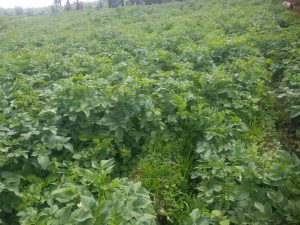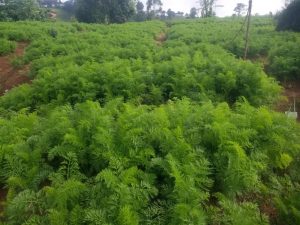Agriculture
INTRODUCTION
Despite the rapid pace of urbanization taking place around the world, a significant number of people still live in rural areas particular in Africa; most of them engaged in smallholder semi-subsistence agriculture. Agriculture remains a crucial sector in most Third-World Countries’ economy, being a major source of raw materials, food and foreign exchange; employing over 70 percent of the labor force in Africa, and serving as a potential vehicle for diversifying the African economy. However, Africa remains one of the continents in which eradication of hunger and malnutrition is an ancient challenge and still currently faced by the national and international community. This is mankind’s oldest quest as well as its most elusive goal. United Nations Sustainable Development Goal N°1 talks about “No Poverty “while Goal N°2 talks about “Zero Hunger”. This tells us that poverty and hunger is an international issue and it is important for MUNED to pose this question:
“Why is it that after centuries of effort of fighting hunger and malnutrition, there is still not enough food for everyone, and that despite the tremendous advances in the world capacity to productively utilize resources, millions die each year of starvation and malnutrition?” A genuine answer to this question can only be sought if we research on the problem.
 BRIEF LITERATURE REVIEW
BRIEF LITERATURE REVIEW
According to National Agricultural Research (NAR) published by Food and Agricultural Organization (FAO) in 1984, hunger and malnutrition and similar issues are being debated with increasing frequency in international fora. The problems of food, hunger and rural poverty were given particular attention by the world Food Conference (WFC) in 1974 followed by the World Conference on Agrarian Reform and Rural Development (WCARRD) in 1979. The search for a solution has been prominent in the present North – South dialogue on a New International Economic Order. This shows over years, man has never ceased to be threatened by hunger and malnutrition. Thus, it is of importance to seek an everlasting solution to this problem. It is for this reason that UN came up with the 2030 Agenda with the first two goals focusing on poverty and hunger.
THE CHALLENGES OF AGRICULTURE
To resolve the problem of hunger and malnutrition currently affecting the world and particularly Africa, there is no doubt that we have to make agriculture the centre part of mankind like never before.
 Agriculture, being one of the mankind’s oldest activities, has provided the basis for the rise of civilization in most African countries. If most African countries are what there are today, it is thanks to agriculture. Despite the contributions of agriculture to the development and civilization of Africa as well as the fight for eradication of hunger and malnutrition in the African continent, this sector have not received enough support from the National or International Technical Assistance Partners like United Nation Development Programmes (UNDP) and Food and Agricultural Organization (FAO) in most poor African countries like South Sudan. It is on records that UNDP and FAO is actually supporting Third-World Countries including Cameroon in strengthening their national Agricultural Research Systems and many national development projects have been implemented but MUNED concern remains the sustainability of such initiative and the targeted areas in Africa like South Sudan in which hunger and malnutrition is alarming. In Cameroon for instance, MUNED will like to question why M’muock in Lebialem Division of the South West which is one of the main producers of food stuff like Irish potatoes, carrots, cabbage, etc have not benefited from both national and international grants and assistance.
Agriculture, being one of the mankind’s oldest activities, has provided the basis for the rise of civilization in most African countries. If most African countries are what there are today, it is thanks to agriculture. Despite the contributions of agriculture to the development and civilization of Africa as well as the fight for eradication of hunger and malnutrition in the African continent, this sector have not received enough support from the National or International Technical Assistance Partners like United Nation Development Programmes (UNDP) and Food and Agricultural Organization (FAO) in most poor African countries like South Sudan. It is on records that UNDP and FAO is actually supporting Third-World Countries including Cameroon in strengthening their national Agricultural Research Systems and many national development projects have been implemented but MUNED concern remains the sustainability of such initiative and the targeted areas in Africa like South Sudan in which hunger and malnutrition is alarming. In Cameroon for instance, MUNED will like to question why M’muock in Lebialem Division of the South West which is one of the main producers of food stuff like Irish potatoes, carrots, cabbage, etc have not benefited from both national and international grants and assistance.
MUNED being a research and publication network is seeking the possibility of letting poorer communities in Africa gain access to both national and international grants and assistance. MUNED plays the intermediary role of linking poorer communities in Africa with both national and international technical assistance partners in the domain of agriculture so that together we can tackle the problem of hunger and malnutrition in Africa.
 AGRICULTURAL RESEARCH IN AFRICA
AGRICULTURAL RESEARCH IN AFRICA
While linking poorer communities in Africa with technical assistance partners, MUNED focuses on agricultural research as a mean of increasing food production in Africa to tackle hunger and malnutrition. The World Food Conference (WFC), the United Nations Conference on Science and Technology for Development (UNCSTD), the World Conference on Agrarian Reform and Rural Development (WCARRD) Programme of Action and FAO Conferences have all stressed the importance of research in the development of appropriate technology for the rural sectors, emphasizing increases research efforts for food grains, farm tools and farm structures. These international assemblies have called particularly for:
1) An increased share of funds for research on problems of rural areas including socio-economic,
2) The better adaptation of research activities to rural needs.
3) Intensification of research on the special problems of less favorable production condition such as rainfed agriculture and shifting cultivation, on harvest and post-harvest losses and storage, on energy uses for agriculture, and on a balanced approach to the exploitation of natural resources.
CONCLUSION
Just as hunger and malnutrition remains fundamental problems affecting the world, such problems can only be resolved if we encourage researches and design special agricultural programmes that seek to improve world food production.
